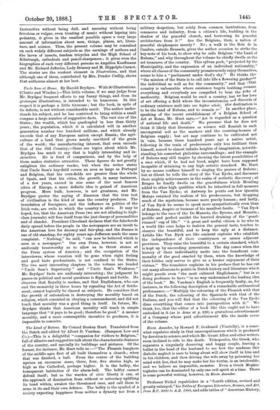Uncle Sam at Home. By Harold Brydges. With 90 Illustrations.
(Chatto and Windits.)—This little volume, if we may judge from Mr. Brydges' frequent efforts to say funny things, and from its grotesque illustrations, is intended to be humorous. In this respect it is perhaps a little tiresome ; but the book, in spite of its defects, is not without considerable merit. The author under- stands his subject, and he has contrived to bring within a small compass a large number of suggestive facts. The vast size of the States ; the wealth, which has quadrupled in less than thirty years ; the population, which it is calculated will in another generation number two hundred millions, and which already exceeds that of any European nation except Russia; the agri- culture of a land that grows nearly one-third of the grain of the world ; the manufacturing interest, that even exceeds that of the Old Country,—these are topics about which Mr. Brydges has much to say that is highly interesting and in- structive. He is fond of comparisons, and by the help of them makes statistics attractive. These figures do not greatly enlighten the ordinary reader, but when the writer states that Uncle Sam's hay-field covers an area as large as Portugal and Belgium, that his corn-fields are greater than the whole • of Spain, and that his cities, the growth, in many instances, of a few years, exceed in size some of the most famous cities of Europe, a more definite idea is gained of American progress. Mere bulk, however, is not greatness, and Mr. Brydges quotes the saying of Emerson that the true test of civilisation is the kind of man the country produces. The inundation of foreigners, and the influence on politics of the Irish vote, are evils to which the country is alive. It may be hoped, too, that the American Press (we are not alluding to high- . class journals) will free itself from the just charge of personalities and of slander. President Cleveland declares that the falsehoods .daily spread before the people in the newspapers are an insult to the American love for decency and fair-play, and the disease is one of old standing, for eighty years ago Jefferson made the same complaint. "Nothing," he said, "can now be believed which is - seen in a newspaper." Our own Press, however, is not so uniformly trustworthy as to allow us to throw stones at the Press system of America ; and the occupation of the interviewer, whose vocation will be gone when right feeling and good taste predominate, is not confined to the States. The two most interesting chapters in the volume are headed "Uncle Sam's Superiority" and "Uncle Sam's Weakness." Mr. Brydges' facts are uniformly interesting ; the judgment he passes on political and moral questions is flippant and feeble. He observes that Royalty is useless, and that Englishmen, who can end the monarchy in three hours by repealing the Act of Settle- ment, cannot logically be classed as subjects. He considers that the growth of rationalism is destroying the morality based on religion, which consisted in obeying a commandment, and did not teach that morality was a good thing in itself. In future, Mr. Brydges thinks that American morality will teach in simple language that "it pays to be good; therefore be good." A meaner morality, and a more contemptible incentive to goodness, it is impossible to conceive.


































 Previous page
Previous page